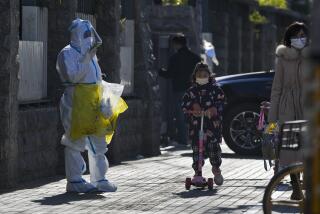China grapples with regional unrest
- Share via
URUMQI, CHINA, AND BEIJING — Chinese President Hu Jintao cut short his state visit to Italy, which included plans to participate in the Group of 8 summit, to return home today because of protests in Urumqi that raised the specter of more ethnic violence.
State news media said Hu left for home to address the unrest in northwestern China’s Xinjiang region and would forgo the G-8 summit this week in the Italian city of L’Aquila. State Councilor Dai Bingguo will attend the summit in Hu’s place, the official New China News Agency said.
Urumqi, the capital of Xinjiang, was under heavy police guard after deadly clashes broke out Sunday between the dominant Han ethnic group and minority Uighurs that left 156 people dead and 1,000 injured, according to figures released Monday.
Thousands of Han Chinese wielding sticks, clubs and knives on Tuesday marched toward a Uighur enclave demanding revenge. Many chanted “Blood for blood!” and sang the national anthem.
“We heard the Uighurs were attacking Hans again,” said a man carrying a metal pipe. “We’re going to kill them.”
Thick formations of riot police rushed to the scene and blocked the marchers at a major square to the south. The firing of tear gas could be heard in the distance as officers tried to hold off demonstrators who had breached the first line of riot police.
“Let the government take care of this,” pleaded a local Communist Party boss, Li Zhi, who stood atop a police vehicle, shouting through a bullhorn. When he suggested that Han and Uighurs needed to coexist, the crowd jeered him.
Chinese authorities imposed an overnight curfew on the city and, as of midday today, almost all businesses remained closed.
Hu’s abrupt return underscores the seriousness with which Beijing views the riots, possibly China’s deadliest social unrest since the Tiananmen Square protests in 1989. The central government has accused exile groups of stirring up violence. Although Xinjiang has for years seen sporadic riots, bombings and gang violence, Urumqi -- a city of 2 million people -- had been held up by the Chinese as a showcase for ethnic harmony.
In a televised speech, Xinjiang’s Communist Party chief, Wang Lequan, pleaded for Hans to lay down their makeshift arms.
“Some Han people took to the streets in Urumqi today, disrupting social order,” Wang said. “It is completely unnecessary.”
“Neither the people of Han nor Uighur ethnicity are willing to see the Han people being attacked,” he said. “It is the same the other way around. If the Han people attack the innocent Uighur people, it is also heartbreaking.”
But the pleas were ignored by thousands of Hans roaming the streets Tuesday, carrying whatever weapons they could pick up or devise -- pipes, garden hoses, shovels. A teenage girl wielding a wooden stick with a rusty nail giggled with her friends. A middle-aged woman brandished the frame of a chair.
Although Chinese forces managed to control the mobs in the center of Urumqi, where foreign journalists were visiting, Uighur sources said that there were deaths elsewhere in the city.
“We are hearing reports that Uighurs were killed in shops and homes in several different parts of Urumqi. We heard that two young women were murdered, but I must emphasize, we cannot confirm anything,” Alim Seytoff, a Uighur spokesman based in Washington, said in a telephone interview late Tuesday.
The Chinese government has not released casualty figures for two days, and has implied that the vast majority of the 156 dead on Sunday were Han Chinese civilians slain by Uighur mobs.
“The Chinese television, by showing scenes of wounded Hans in hospitals, is inflaming the nationalist sentiments and hatred towards Uighurs,” Seytoff said.
The Uighurs are a Turkic people, who are predominantly Muslim and speak a language that differs from Chinese.
The World Uyghur Congress, headquartered in Munich, Germany, says significant numbers of Uighurs were killed Sunday in the aftermath of what had started as a peaceful demonstration against ethnic discrimination. They said that as many as 17 students were killed about 8 p.m. outside Xinjiang University, where they were gathering by a bus stop after the protest.
A Uighur interviewed Tuesday who gave his name only as Amir said he was shocked that the protests had escalated.
“All this fighting is useless,” the 26-year-old man said while sitting opposite a public park filled with police. “I just don’t believe people would want to live like this.”
A young man with a shaved head carrying two cleavers then walked by.
Amir got up and said, “I have to go. I love my safety.”
--
barbara.demick@latimes.com
More to Read
Sign up for Essential California
The most important California stories and recommendations in your inbox every morning.
You may occasionally receive promotional content from the Los Angeles Times.














